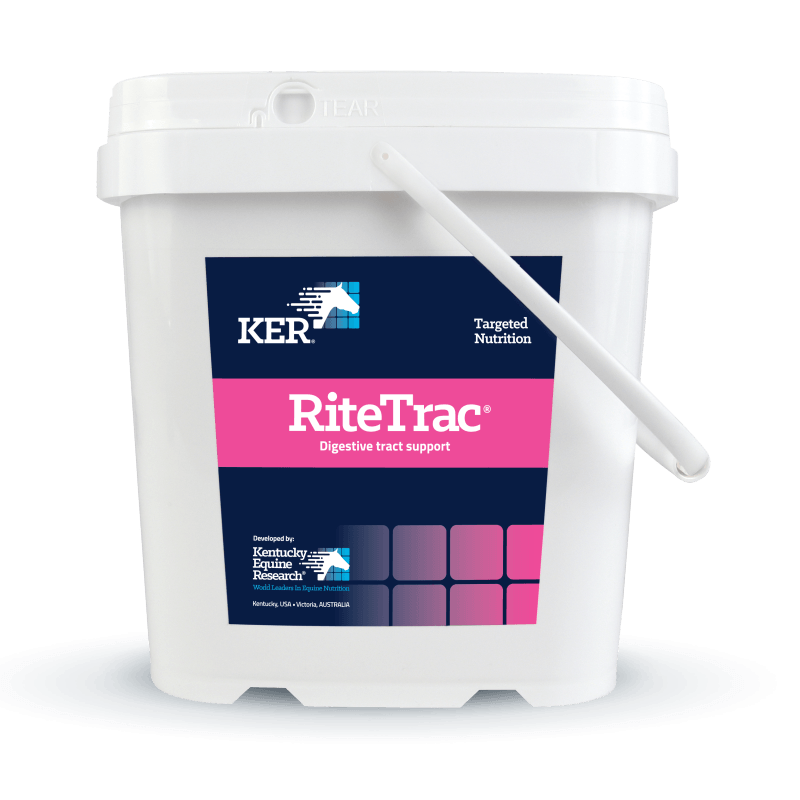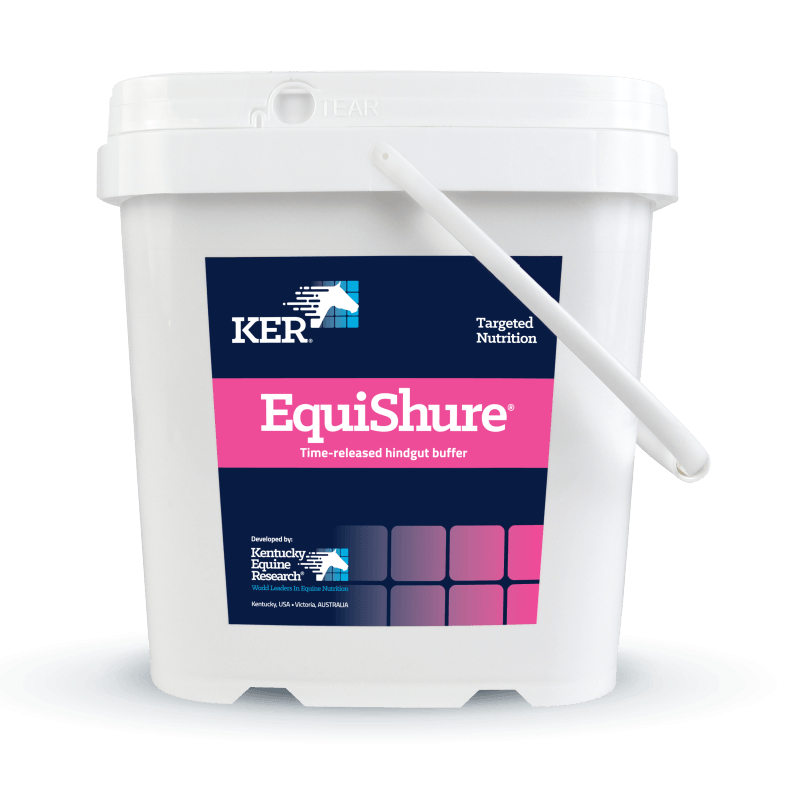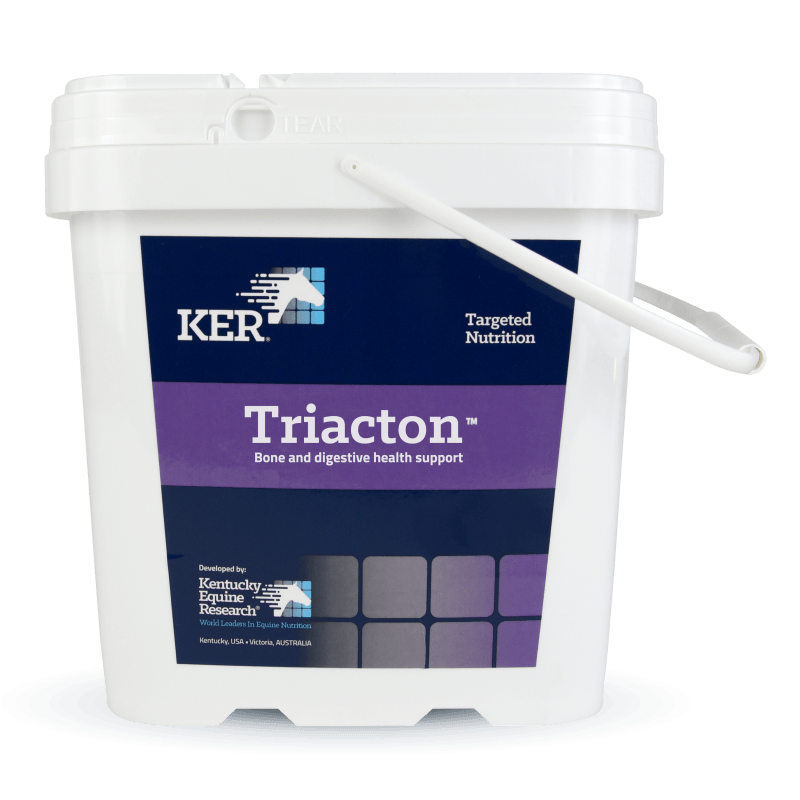Formulated by the scientists at Kentucky Equine Research, RiteTrac® is a proprietary blend of ingredients designed to support total digestive tract health. Targeted at both the foregut and hindgut of the horse, RiteTrac works in two distinct ways. First, with its combination of fast-acting antacids and coating agents, RiteTrac quickly neutralizes excessive gastric acid, protecting the stomach lining and restoring the normal gastric environment. Second, RiteTrac contains EquiShure®, a time-released hindgut buffer designed to act on the cecum and colon by minimizing the effects of subclinical hindgut acidosis.
RiteTrac contains ingredients that quickly and effectively protect the sensitive stomach lining, preventing the damage caused by the continuous production of gastric acid.
RiteTrac is Suitable for Many Horses, Including Those
- At risk of gastric and colonic ulcers
- In training or work
- On high-grain diets
- Grazing lush pasture
- Experiencing stressful conditions such as travel, show/sale preparation, and weaning
- With unexplained behavioral problems
- With weight loss of unknown origin
- Prone to mild colic with no obvious reason
- Susceptible to laminitis
- With digestive upsets
The antacids contained in RiteTrac rapidly neutralize the acid secreted in the stomach, providing a more pH-neutral environment between meals.
Modern equine management practices have resulted in horses being exposed to situations vastly different to those in which they evolved, including solitary stall confinement, limited grazing, grain as an energy source, and meal feeding. These environments and management practices, although convenient to caretakers, have the potential to be less than optimal for the horse’s health and performance. One debilitating condition influenced by modern horse management is ulceration of both the stomach and colon. It is estimated that nearly 90% of horses suffer from gastric ulcers, and more recent research has shown that over 60% of performance horses suffer from colonic ulcers. Approximately 54% of performance horses suffer from both gastric and colonic ulcers, leading to compromised health and decreased performance.
RiteTrac Promotes Stomach Health
Once thought only to affect elite equine athletes, gastric ulcers are prevalent in all sectors of the equine population — from broodmares to ponies, racehorses to show horses. Nearly every horse is at risk. Unlike humans, horses continuously secrete gastric acid, and ulcers are the result of erosion of the stomach lining due to prolonged exposure to this gastric acid. Risk factors include stressful situations, intermittent meal feeding, stall confinement, high-grain diets, transport, intense exercise, and chronic administration of nonsteroidal anti-inflammatory drugs. Horses that go for long periods of time without feeding are especially vulnerable.
Due to the prevalence and severity of equine gastric ulcers, there has been much research into methods to prevent gastric ulceration in horses. Initially, gastric ulcers were thought to most commonly occur in the sensitive nonglandular or squamous region of the stomach, but recent research has shown otherwise. A Danish study of 201 horses of mixed age and type (including foals, broodmares, and performance horses in light and heavy work) reported an 83% incidence of gastric ulcers. In addition, 32% of the population had ulcers only in the nonglandular region, 17% had ulcers in the glandular region only, and over 50% had ulcers in both the glandular and nonglandular regions.1 Additionally, researchers have shown that gastric ulcers can affect physiological factors influencing performance such as maximal oxygen uptake.2 Signs of gastric ulcers include loss of appetite, weight loss, colic, poor coat, difficult behavior, and decreased performance.
The antacids contained in RiteTrac rapidly neutralize the acid secreted in the stomach, providing a more pH-neutral environment between meals. Similar compounds have also been shown to have a role in alleviating clinical signs in horses with severe ulceration.
Protects the Sensitive Equine Hindgut
The hindgut of the horse contains beneficial bacteria required for the digestion of fiber. The environment in which these bacteria flourish is easily disrupted when horses consume significant amounts of soluble carbohydrates, which are present in lush pasture and grain, and are rapidly fermented in the hindgut. The primary effect of this excessive fermentation is a serious reduction in the pH of the hindgut environment through accumulation of lactic acid. Disruption of this delicate hindgut environment can result in hindgut acidosis, characterized by decreased forage digestion, general digestive upsets, and production of endotoxins (which can cause a number of serious conditions including laminitis and colic).
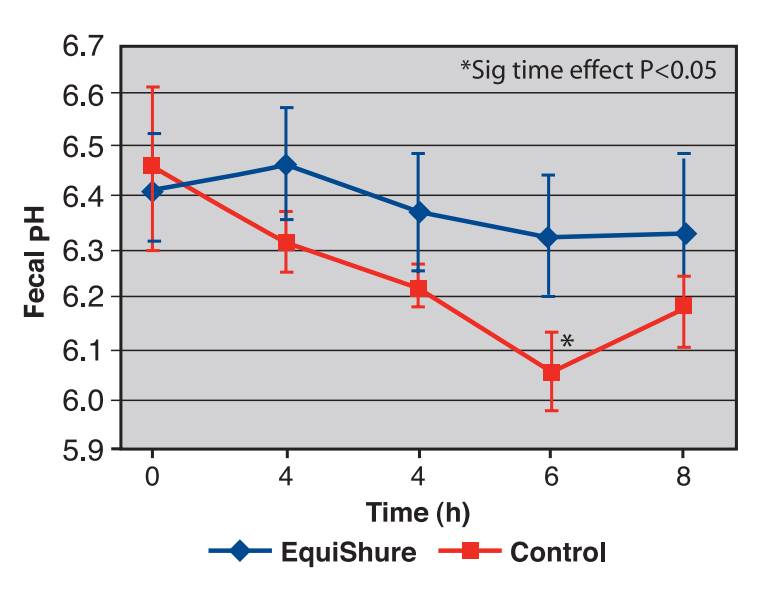
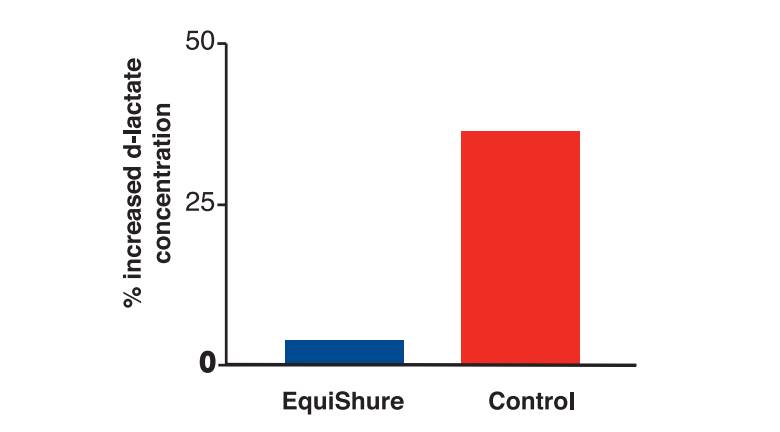
Research at Kentucky Equine Research has shown that horses consuming EquiShure, a time-released hindgut buffer, did not exhibit hindgut acidosis when subjected to a hindgut challenge of elevated grain or fructan as found in lush pasture (Figures 1 and 2).3 EquiShure, which is contained in RiteTrac, helps moderate gut conditions by preventing the drastic drop in pH associated with high lactate production and supports lactic-acid utilizing bacteria to enhance the natural production of volatile fatty acids (VFA) from starch and cellulose. While VFA are weak acids and will reduce pH, the dramatic effects of lactic acid acidosis are moderated and the associated problems attenuated by the time-released buffer EquiShure contained in RiteTrac.
1 Luthersson N., K. Hou Nielsen, P. Harris, and T.D.H. Parkin. 2008. Risk factors associated with EGUS in 201 horses in Denmark. British Equine Veterinary Association (BEVA) Congress Proceedings.
2 Nieto, J.E., J.R. Snyder, N.J. Vatistas, and J.H. Jones. 2009. Effect of gastric ulceration on physiologic responses to exercise in horses. American Journal of Veterinary Research 70:787-795.
3 Pagan, J.D., T.J. Lawrence, and L.A. Lawrence. 2006. Feeding protected sodium bicarbonate attenuates hindgut acidosis in horses fed a high-grain ration. American Association of Equine Practitioners (AAEP) Proceedings 53:530-533.
Feeding directions
Feed 120 g daily. For best results, split between two feedings.
1 scoop = 60 g
Feeding guidelines for racehores: Trainers and managers should adhere to the regulations set forth by specific racing jurisdictions prior to using any feed additives or supplements. HISA Compliance
